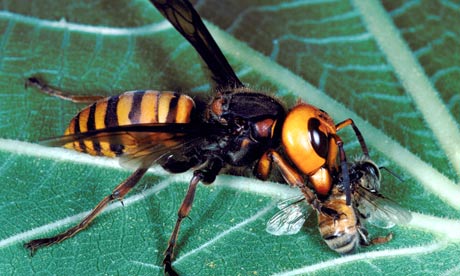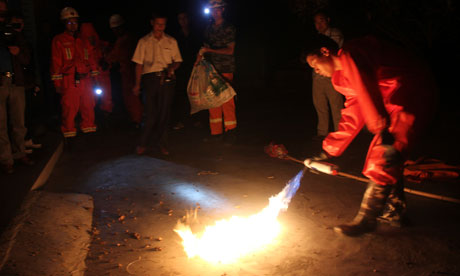The Chinese city living in fear of giant killer hornets
Jonathan Kaiman visits Ankang municipality where swarms of highly venomous hornets have killed 41 people in three months
Jonathan Kaiman in Ankang
theguardian.com,
Chen pointed with a shaky hand at the small plot of cabbage, spring onions and corn where his friend, Yu Yihong, had been stung to death by giant hornets.
“When he got to the hospital, there were still two hornets in his trousers,” said Chen, a farmer who, like many villagers, declined to give his full name to a foreign journalist. “The hornets’ poison was too strong – his liver and kidneys failed, and he couldn’t urinate.”
Yu, a square-jawed 40-year-old farmer in perfect health, had been harvesting his crops when he stepped on a nest of Vespa mandarinia hornets concealed beneath a pile of dry corn husks. The hornets swarmed around Yu, stinging him through his long-sleeved shirt and trousers. He ran, but the hornets chased him, stinging his arms and legs, his head and neck.
After Yu succumbed to the poison about 50 of his friends and relatives gathered to mourn his passing. Outside the farmer’s mountainside home in Yuanba village, they ate preserved eggs, buckwheat noodles and boiled peanuts in silence; one set off a string of fireworks. Yu’s wife and two children sat inside, weeping.
V mandarinia is the world’s largest hornet, around the size of a human adult’s thumb, yellow and black in colour and highly venomous. Its 6mm-long stingers carry a venom potent enough to dissolve human tissue. Victims may die of kidney failure or anaphylactic shock.
 An Asian hornet (vespa mandarinia) eats a honeybee. The sting of the highly venomous giant hornet, which measures about the size of a human thumb, can dissolve human tissue and cause kidney failure. Photograph: Scott Camazine
An Asian hornet (vespa mandarinia) eats a honeybee. The sting of the highly venomous giant hornet, which measures about the size of a human thumb, can dissolve human tissue and cause kidney failure. Photograph: Scott Camazine
Yu’s story is a tragic but increasingly common one in north-west China‘s Shaanxi province, where, over the past three months alone, hornets have killed 41 people and injured a further 1,675. Ankang, a municipality in the province’s south, appears to be the centre of the attacks. While hornets infest its mountainous rural areas every year – 36 residents were stung to death between 2002 and 2005 – local people and municipal officials say this year it is tantamount to an epidemic, the worst they have ever seen.
At least some of the deaths were caused by V mandarinia, experts say. The species does not typically attack unless it feels its nest is threatened. But when it does, it can be fierce and fast – the hornets can fly at 25mph and cover 50 miles in a day. They make their homes in tree stumps or underground, making nests extremely difficult to detect.
People blame this year’s scourge on climate change: the past year has been unusually warm, allowing a high number of hornets to survive the winter. Huang Ronghui, an official at the Ankang Forestry Bureau’s pest control department, lists a host of other possibilities: the hornets may have been agitated by a dry spell, while labourers have been moving deeper into the mountains, disturbing their nests. “Other than this, hornets are attracted to bright colours and the smell of people’s sweat, alcohol and sweet things,” he told state media. “They’re sensitive to movement, such as running people or animals.”
The region has also been overrun by the Asian hornet, Vespa velutina, a slightly smaller species which can be equally dangerous. Hundreds, even thousands, inhabit each nest, which typically hangs from a high place. In Chengxing village, a few miles down a winding mountain road from Yu’s home village, 16-year-old Tan Xingjian pointed at a tree in the distance. Hanging from one thick branch was a pale, basketball-sized bulb, its surface alive with darting black specks. “That’s where they live,” Tan said. “We don’t dare to go near there.”
Ankang is on alert, with the local authorities posting warning notices online, on roadside treetrunks and on primary school walls. The crisis has exhausted Gong Zhenghong, the spiky-haired mayor of Hongshan township in rural Ankang. Since September, Gong has spent nearly every night wandering the township exterminating nests. He says there are 248 hornet nests in Hongshan, with 175 close to schools and roads.
Gong and his team survey nests by day; once the sun sets, they dress in homemade anti-hornet suits made from rain jackets and canvas, and burn the nests with spray-can flamethrowers. “They don’t fly around at night,” he said. Sometimes the team begins work in the late evening and doesn’t finish until 2am. “We’d normally send the fire squad to do this, but this year there were too many nests.” Gong left his office, returned with a black rubbish bag, and pulled out the charred remains of a nest, the blackened tails of bulb-like larvae protruding from its combs.
 Firefighters destroy dead hornets in Ankang, Shaanxi province, China. Photograph: China Stringer Network/REUTERS
Firefighters destroy dead hornets in Ankang, Shaanxi province, China. Photograph: China Stringer Network/REUTERS
Two other cities in Shaanxi – Hanzhong and Shangluo – have also been besieged by hornets, though the death tolls have been markedly lower. In southern China’s Guangxi Zhuang autonomous region, a swarm of hornets attacked a primary school in mid-September, injuring 23 children and seven adults. The teacher, Li Zhiqiang, told pupils to hide under their desks and tried to fight the creatures off until he lost consciousness, state media reported.
The hornets seem ubiquitous in Ankang. In Liushui township, a scattering of two-storey concrete homes sandwiched between a lush hillside and a stagnant river, an elderly shopkeeper in a purple blazer said the hornets had infested a cabbage patch near her home. “The government has been coming down and burning them, but they can’t burn them all,” she added, pointing down into the brush. “I’m not willing to go down there.”
Mu Conghui, a 55-year-old Ankang villager, was stung 200 times while tending her rice field in late August. “These hornets are terrifying – all at once they flew to my head, and when I stopped, they stung me so much that I couldn’t budge,” she told state media. “My legs were crawling with hornets. Right now my legs are covered with small sting holes – over the past two months I’ve received 13 dialysis treatments.”
The Ankang government says it has removed 710 hives and sent 7m yuan (£707,000) to help affected areas. “We’re doing everything we can, but there’s only so much we can do,” says Deng Xianghong, the deputy head of the Ankang propaganda department. “God has been unfair to us.”



